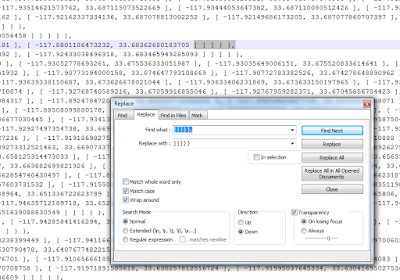1) Go to http://www.ogr2gui.ca/ download GDAL ogr GUI tools
2) use tool to convert shape to geojson ( geoJSON use latitude and longitude, project code is
4326: WGS84)
3) mongoimport will see it as single document, however I need multi document for each record, I need to modify the geojson file, first remove head portion (selected text), then remove foot portion( selected text)
4) remove , at each line end. each line should be a json object, it looks like {......} without ","
So you should replace ] ] ] } }, with ] ] ] } } as show below
5) run mongoimport as
C:\Program Files\MongoDB\Server\3.0\bin>mongoimport --db civilgis --collection p
arks C:\Users\hu_j\Downloads\parks.geojson
--db : database name
--collection : table name
then the geojson file
this case it import 41 document
6) index the coordinate to speed up the performance
db.zoning.createIndex({"geometry":"2dsphere"})
db.parks.ensureIndex({"geometry":"2dsphere"})
db.collection.createIndex( { <location field> : "2dsphere" } )
Note: keep the format of "coordinate [[[ ]]]" do not change to coordinate [[ ]],
otherwise, db.xxx.ensureIndex({"geometry": "2dsphere"}) will fail.
Error and fix
mongoimport error tells you location at line number #14683, in this case you need to replace
"geometry": null }, without ","
Error 2 and fix
db.parcels.ensureIndex({geometry:"2dsphere"})
"errmsg" : "exception: Can't extract geo keys:.......
.....
] ] Duplicate vertices: 29 and 47",
fix by remove the duplicate coordinate(vertice). start from 0, the 29th point and 47th point are duplicate, remove 47th, note that last coordinate before ]]duplicate vertices is NOT the 29th nor 47th, you have to manually count 29th point and delete it.
first find by APNLINK: \"41051111\" copy that record to new document, then find the duplicate coordinate by count 29th
"errmsg" : "exception: Can't extract geo keys: { _id: ObjectId('55ca7991
21167708171b06ba'), type: \"Feature\", properties: { CITYSTZPRP: \"Ca\", OWNER_N
AME: \"Casden Lakes\", Legal_Desc: \"N TR 12341 LOT A\", HOUSE_NO: null, APN: \"
410-511-11\", APNLINK: \"41051111\", ADDR_NUMBE: null, STREET: null, SUFFIX: nul
l, OBJECTID: 981, FID_points: 41051111, ADDRESS: null }, geometry: { coordinates
: [ [ [ -117.8772983067213, 33.69316895497129 ], [ -117.8771896001406, 33.693156
after fix the whole parcels.geojson, you have to drop current parcels in mongoDB, re-import parcels.geojson then create index
================================================================
http://zaiste.net/2012/08/importing_json_into_mongodb/
Importing JSON data into MongoDB can be tricky. By default, assumes a special structure for a file to import from: similar to JSON format except that only one document per line is allowed with no comma after each of them - something like:
It would be easier, however, to use a traditional JSON instead of adapting it to this special format required by MongoDB. Luckily, we can force to import the data as a JSON array using parameter.
Let's suppose we have a file with the following content:
We can import it to our local MongoDB database using following command:
If the specified collection doesn't exist, it will be automatically created; otherwise new documents will be appended to the existing one.












No comments:
Post a Comment